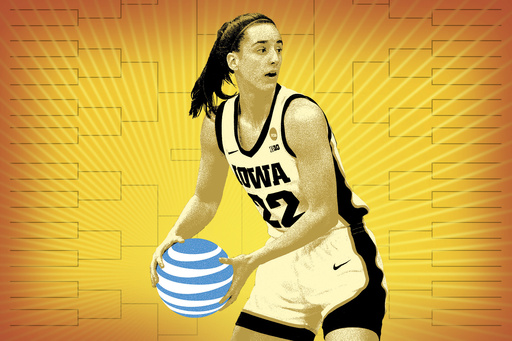NEW YORK (AP) — Who do you have winning your college basketball bracket? The head of AT&T’s marketing is hoping that you’ll respond by asking, “For which tournament?”
The telecommunications giant is once again sponsoring the men’s and women’s college basketball tournaments. It’s also significantly increasing its investment in the women’s tournament as the record-setting superstar from the University of Iowa, Caitlin Clark, draws in more viewers. Kellyn Smith Kenny, chief marketing and growth officer at AT&T, recently spoke with The Associated Press about the tournaments. The conversation has been edited for length and clarity.
Q: Can you put into context how big a phenomenon Caitlin Clark is right now from a marketer’s perspective?
A: She is a big deal. The impact that she has had on viewership for the sport, buzz, social activity around her, the social activity around Iowa, it’s managed to take all of the incredible coverage and popularity of last year and amplify it.
Last year, the final game of the women’s March Madness was just shy of 10 million viewers. What we’re seeing this year is numbers blowing away (last year’s trends).
Q: So you want to advertise on her games?
A: One of the things that’s amazing about it is women’s sports is a really smart investment for brands and advertisers to make. Viewers of women’s sports, they have a disproportionate share of their households’ discretionary spend. They’re far more likely to remember and recall the brands that advertise during women’s sports, and they associate those brands with being supportive of women’s sports.
It seems like we’re in this moment of the power of the woman, and the power of the girl. From what we saw last year with Beyonce and Taylor Swift and their tours, and this year with Caitlin (Clark) and Sabrina (Ionescu, a professional basketball player), there’s incredible momentum.
Q: Does Caitlin Clark remind you of another superstar, or does this all feel new?
A: I think this is potentially once in a generation. If I compare her to other athletes and the type of heat she has in her sport, you’ve got Mikaela Shiffrin in skiing and Serena Williams in tennis. It is incredible how much momentum and how much true passion for the sport she has been able to create.
Q: So next year will be a letdown for the women’s college tournament when she’s no longer playing in it?
A: Because she’s brought so much attention to the sport, now there are other households names. LSU’s victory over Iowa last year also created emerging stars and household names. I’m hopeful she’s almost a spark that ignites a fire. I think that’s what we’re looking for. There’s so much attention on women’s sports.
Q: Is AT&T doing anything different with the women’s tournament this year than in years past?
A: We do have a long track record of investing in women’s sports. The hype around women’s sports is intensifying, but we were always big believers of women’s sports.
From 2023 to 2024, we are doubling our media investment in the women’s tournament.
We are a sponsor of March Madness brackets, and we are on a mission to encourage more bracket equity. Every time someone asks: “Did you fill out a bracket for March Madness?” we want the response to be: “Yes, I filled out two, both women’s and men’s.”
Q: If we can pull the lens out more broadly to live sports in general, do you find that it’s still the premier way to get in touch with potential customers?
A: There’s no question that what live sports can deliver is fans who don’t hop around to other shows. They are very engaged. They feel very passionate and connected to the content, so it is one of the most stable mass reach vehicles to reach our customers and to reach our prospects.
The thing that’s so incredible about sports is that it’s a shared passion. When brands advertise and communicate through sports, fans can figure out very quickly if this brand is an authentic sports fan, truly understands fandom and the players and the coaches and the dynamics. Everything AT&T does, we are trying to meet fans where they are. We think way beyond the commercial and the advertising.
Q: Even with the fracturing of media, you’re still finding those fans?
A: Last year 30% of games viewed were over a mobile device. We’ve seen that number increase every year. This emphasizes how critical it is that when brands tell their story, we’re not limiting it to broadcast television. We have to adapt to how 30% or more are going to be looking on a phone or tablet, which means it’s easy to toggle to other apps or experiences.
(Along with cameras above the basketball rim and attached to drones,) we had pylon-cams in college football: AT&T 5g-enabled cameras giving fans an inside look at whether they make it (into the end zone) by a hair of a centimeter.
Q: Are the audiences of the men’s and women’s tournaments very different, or are they converging?
A: We are starting to see that it is converging a bit. It’s not this nascent, small little niche fan base for women’s basketball. The appeal is broadening.



